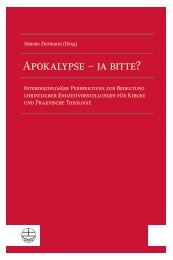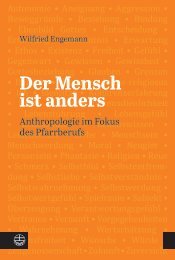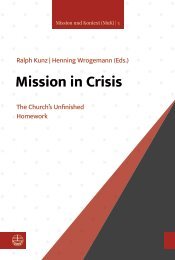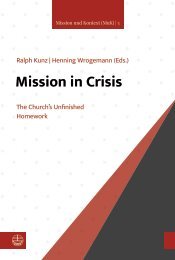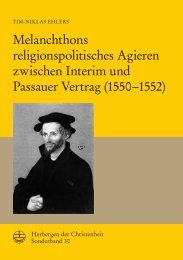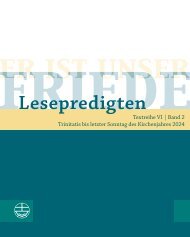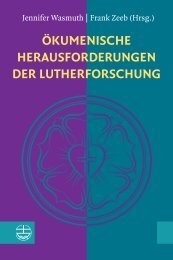Phillip A. Davis, Jr. | Daniel Lanzinger | Matthew Ryan Robinson (Eds.): What Does Theology Do, Actually? (Leseprobe)
You also want an ePaper? Increase the reach of your titles
YUMPU automatically turns print PDFs into web optimized ePapers that Google loves.
136<br />
Ludger Schwienhorst-Schönberger<br />
1. The Ecclesiological Principle in Catholic<br />
Hermeneutics<br />
This brings us to the first, foundational principle of Catholic hermeneutics: the<br />
ecclesiological principle.<br />
Among popes of all ages, it was Pope Benedict XVI. who had the greatest<br />
concern for questions of Scriptural interpretation. This was the case during his<br />
time as Professor of <strong>Theology</strong>, as Prefect of the Congregation for the <strong>Do</strong>ctrine of<br />
the Faith, and as Pope. In the latter role, he provided the Church with the longest<br />
and most theologically advanced document on the interpretation of Scripture in<br />
the Catholic Church, the Post-Synodal Apostolic Exhortation Verbum <strong>Do</strong>mini on the<br />
Word of God in the Life and Mission of the Church, published on September 30,<br />
2010. 1 Why is this document dated September 30? Who knows the answer? The<br />
Catholic reader should: it is the day commemorating Saint Jerome, patron saint<br />
of the exegetes.<br />
In its German translation, the document comprises 175 pages, divided into<br />
124 sections. I would like to present the foundational principles of Catholic<br />
Scriptural interpretation according to this document. I will particularly be focusing<br />
on sections 29 to 40 of part one, which is captioned ‘‘The Interpretation of<br />
Sacred Scripture in the Church’’, and I will use several quotes from these paragraphs<br />
and indicate the paragraph number in parentheses.<br />
In this document, we encounter the ecclesiological principle as the first<br />
which is named for Catholic biblical understanding: ‘‘The Church as the primary<br />
setting for biblical hermeneutics’’. 2<br />
One of the key statements of this section<br />
reads: ‘‘[T]he primary setting for scriptural interpretation is the life of the Church.<br />
This is not to uphold the ecclesial context as an extrinsic rule to which exegetes<br />
must submit, but rather is something demanded by the very nature of the Scriptures<br />
and the way they gradually came into being’’ (29; emphasis original). This<br />
sentence alone could keep us busy for a while. The traditional objection is: <strong><strong>Do</strong>es</strong><br />
the Church want to dictate to me how I, the exegete, am to interpret the Bible?<br />
This could be discussed extensively. For our purposes, one short comment must<br />
suffice: Exegesis is no purely academic matter. 3 It is a mode of living. Just as we<br />
can only understand other cultures when we take part in them, we can ulti-<br />
1<br />
Available at https://www.vatican.va/content/benedict-xvi/en/apost_exhortations/documents/<br />
hf_ben-xvi_exh_20100930_verbum-domini.html.<br />
2<br />
Cf. Ludger Schwienhorst-Schönberger, ‘‘Sola scriptura? Luthers Schriftverständnis aus<br />
katholischer Sicht,’’ in Martin Luther im Widerstreit der Konfessionen: Historische und<br />
theologische Perspektiven, ed. Christian Danz and Jan-Heiner Tück (Freiburg: Herder,<br />
2017), 152---74.<br />
3<br />
Cf. Ludger Schwienhorst-Schönberger, ‘‘‘Keine rein akademische Angelegenheit’: Zum<br />
Verhältnis von Erklären und Verstehen in den Jesus-Büchern von Joseph Ratzinger /<br />
Benedikt XVI.,’’ in Der Theologenpapst: Eine kritische Würdigung Benedikts XVI., ed. Jan-<br />
Heiner Tück (Freiburg: Herder, 2013), 184---206.





